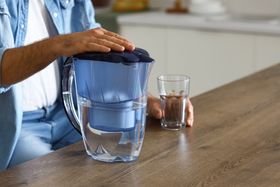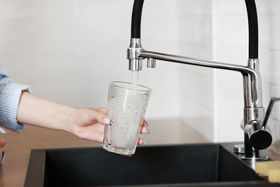5 Benefits of a Charcoal Water Filtration System
Worried about what's lurking in your tap water? Charcoal water filters offer a simple and effective solution. Learn their benefits for your health.
Published February 9, 2025

Ever walked into your kitchen, turned on the tap, and been met with a less-than-appetizing smell or taste? Or maybe you're concerned about the invisible contaminants lurking in your water, the ones you can't see or smell but could potentially impact your health? It's a common problem.
Our tap water, while often treated, can still contain chlorine, VOCs, pesticides, and even heavy metals—not exactly the refreshing drink you're looking for. And let's not even talk about the cost and environmental impact of constantly buying bottled water.
Below, you will explore the benefits of using a charcoal water filtration system, a simple yet effective solution for improving your water quality and your peace of mind.
» Filter and remineralize your tap water using the full cycle method
1. Proven to Work
There's actual scientific proof that these filters work. Studies in science journals, like the Journal of Environmental Science and Technology, have shown that charcoal filters can lower the amount of chlorine, volatile organic compounds, and some heavy metals in water [1].
Researchers have also found that they can take out some of the medicines that end up in water, which is a growing concern [1]. Although they aren't perfect, scientists are working on ways to make charcoal filters even better at dealing with these newer types of pollution.
» Learn what to do if you drink contaminated water
2. Sustainable
Charcoal filters remove heavy metals, pesticides, and volatile organic compounds from the water, preventing them from getting into our rivers, lakes, and oceans.
They also contribute to sustainability by reducing our reliance on plastic. Think about all those bottles piling up in landfills. When you use more a charcoal filtration system, you're less likely to buy plastic bottles.
We're talking less pollution and less drain on resources like oil, which is used to make plastic. So, by choosing a charcoal filter, you're not just getting cleaner water; you're also making a more eco-friendly choice.
» Check out the benefits of using glass over plastic for your drinking water
3. Easy to Use
Charcoal water filters are popular because they're aslo easy to use and maintain. You can find them in all sorts of setups—pitchers, faucet attachments, even whole-house systems.
And the best part? Once you've got one installed, you don't have to do much. Just swap out the filter every now and then, and you're good to go. This simplicity makes them a really practical choice for busy households that want better water without a lot of fuss.
» Find out if activated charcoal can filter viruses
4. Budget-Friendly
Beyond being easy to use, they are also pretty budget-friendly, especially when you compare them to other water purification methods. They offer a lot of bang for your buck by improving the taste and the safety of your water.
Plus, think about how much you spend on bottled water. With a charcoal filter, you can ditch the plastic bottles, which not only helps the environment but also saves you money in the long run.
So, if you're looking for an affordable and easy way to get cleaner, better-tasting water, charcoal filters are definitely worth considering.
» Does your water smell odd? Check out filters that can remove odor
5. Cheaper Than Alternatives
When it comes to water purification, cost is always a factor, and charcoal filters often come out on top. They're generally more affordable than other options, like reverse osmosis or distillation.
And it's not just the initial cost that's low. Keeping a charcoal filter running is also easy on the wallet. All you really need to do is replace the cartridges every so often. You don't have to worry about expensive repairs or constantly buying extra parts, unlike some of the more complex systems out there.
» Find out which water filtration system is best for your house
How Charcoal Water Filters Work
Charcoal water filtration purifies water through a process called adsorption where contaminants adhere to the porous surface of the activated carbon.
Here's a breakdown of the process:
- A pre-filter traps larger particles such as sediment, sand, and rust. This prevents the carbon filter from becoming clogged.
- The activated carbon, due to its large surface area, attracts and binds various contaminants. These include chlorine, volatile organic compounds (VOCs), pesticides, and odor-causing compounds. This improves the water's taste and smell.
- The carbon interacts with chemicals like chlorine and chloramines, breaking them down into less harmful substances.
- A final filtration stage removes any remaining fine particles and residual contaminants, resulting in cleaner water.
» Trouble with limescale? Explore a list of filters that can remove calcium
What Contaminants Do Charcoal Filters Remove?
- Heavy metals like lead, mercury, arsenic, and cadmium can make you sick, even in small amounts. Charcoal filters grab and hold onto them tightly. They also grab less common heavy metals like chromium (VI).
- Pesticides and herbicides, like DDT and glyphosate, often get into water from farms. Charcoal filters trap these chemicals, including less common bug killers, making your water safer to drink.
- Volatile organic compounds (VOCs) like benzene and chloroform can come from factories or household products. These can cause health problems. Charcoal filters help get them out of your water.
- Chlorine and chloramine are often used to clean water, but they can make it taste and smell bad and irritate your skin. Charcoal filters remove these chemicals.
- They also remove other agents used to disinfect water, like halo-acetic acids, which might cause health problems later on.
- When it comes to pharmaceuticals, charcoal can be quite effective at adsorbing many of them, especially those with non-polar characteristics. Think of it like how oil and water don't mix—non-polar molecules tend to stick to the charcoal's surface.
» Tap filters vs. osmosis: Find out which are better for you
What Charcoal Filters Can't Remove
Microplastics present a different challenge. While charcoal filters can trap some, particularly larger particles, they're less efficient with the smaller ones. Research is ongoing to determine just how effective charcoal can be for different sizes of microplastics.
Other micropollutants, such as those found in personal care products or industrial chemicals, are also addressed by charcoal filtration. The porous structure of activated carbon allows it to adsorb these substances.
But, its performance may not be as robust as it is with more traditional contaminants. In these cases, a multi-barrier approach to water purification, combining charcoal filtration with other methods like reverse osmosis may be necessary for more comprehensive removal.
For example, the MAYU Full Cycle System provides healthier, better-tasting water through a multi-step process:
- A countertop reverse osmosis filter removes all contaminants, even microplastics. But, it also removes minerals.
- You then use the included drops to remineralize your water
- Finally, you aerate the water, which can help improve taste and odor, which charcoal filters may not fully address.
The Clear Choice for Cleaner Water
From improving the taste and odor of your water to protecting you from harmful contaminants and contributing to a more sustainable lifestyle, charcoal filters offer a range of benefits that are hard to ignore.
They're affordable, easy to maintain, and a great way to ensure you and your family are drinking clean, healthy water. While other filtration methods may be suitable for specific needs, charcoal filtration provides a balanced and practical solution for most households.
It's a small change that can make a big difference in your health, your wallet, and the environment. If you're looking for a simple, effective, and eco-friendly way to upgrade your water, charcoal filtration is definitely worth exploring.
» Need a charcoal filter alternative? Treat your tap water in 3 steps
Resources:
- Drinking Water and Health: Volume 2. Available: https://www.ncbi.nlm.nih.gov/books/NBK234593/#:~:text=The%20frequency%20of%20GAC%20regeneration,need%20for%20an%20adsorption%20process.
Disclaimer: The information published by Mayu Water is not a substitute for the expert knowledge, advice, and recommendations of trained professionals. We strongly recommend consulting with industry experts and primary or scientific sources before making any health, research-related, or other important decisions.













































